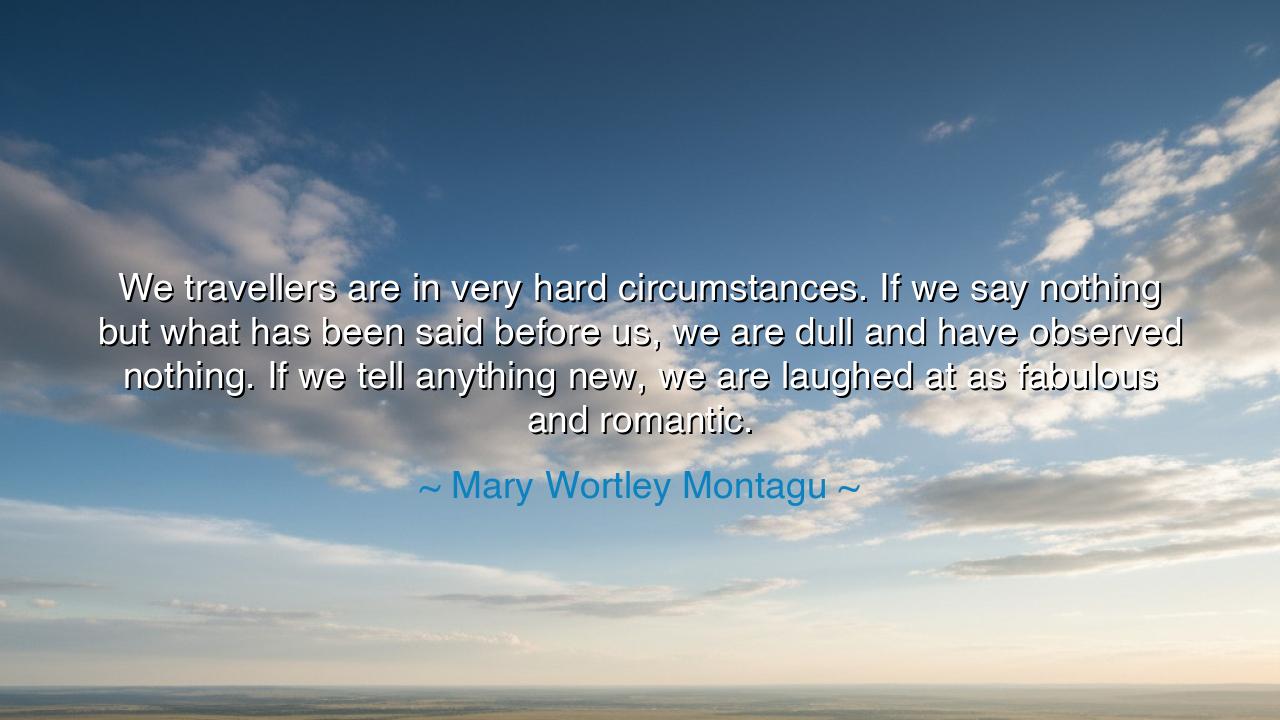
We travellers are in very hard circumstances. If we say nothing
We travellers are in very hard circumstances. If we say nothing but what has been said before us, we are dull and have observed nothing. If we tell anything new, we are laughed at as fabulous and romantic.






In the words of Mary Wortley Montagu, traveler, writer, and bold observer of distant lands, there emerges a truth that has echoed across the centuries: “We travellers are in very hard circumstances. If we say nothing but what has been said before us, we are dull and have observed nothing. If we tell anything new, we are laughed at as fabulous and romantic.” These words strike at the eternal dilemma of the witness who journeys beyond the familiar, who returns with treasures of experience, yet finds their voice caught between disbelief and dismissal.
The ancients knew this struggle well. Herodotus, called the “Father of History,” was accused of telling fanciful lies because he wrote of distant peoples and their strange customs. Marco Polo, returning from the East, was mocked by his countrymen, who believed his tales of China to be fabrications. Thus, Montagu’s lament is not hers alone—it is the lament of every traveller whose eyes have seen beyond the horizon, whose words have sought to bridge the known with the unknown.
For what does it mean to travel? It is not only to cross mountains or seas, but to cross the boundaries of one’s imagination. The traveller carries back not only objects and maps, but perceptions, truths that challenge the familiar. Yet to bring the new before those who cling to the old is to risk scorn. Montagu herself, having lived in the Ottoman Empire, dared to praise customs and traditions unfamiliar to her English peers. She wrote of women’s lives behind veils, not as oppressed, but as possessing forms of freedom invisible to outsiders. For this, she was called too daring, too romantic, as if truth itself were untrustworthy when it contradicted prejudice.
History is filled with such examples. When Galileo turned his telescope to the heavens, he described moons circling Jupiter. His contemporaries sneered, some refusing even to look through his lens, claiming his revelations were impossible. He too was a traveller, not across oceans but across the skies, and he too bore the weight of Montagu’s dilemma: to repeat the old was dull; to speak the new was heresy. His words, like hers, show the price of vision in a world slow to believe.
The deeper meaning of Montagu’s words is that truth often walks in exile before it finds its home. The traveller, by nature, dwells between worlds: welcomed in none, questioned by all. Yet their task is holy, for they carry the seeds of transformation. What is dismissed today as fabulous and romantic may be embraced tomorrow as wisdom. Thus, the ridicule borne by the traveller is but the labor of planting in hard soil, waiting for the harvest that others cannot yet see.
The lesson, then, is clear: do not silence your truth for fear of scorn. If you have observed, if you have lived, if you have seen beyond the narrowness of your home, speak boldly. Some will mock, some will resist, but a few will listen—and through them, change will come. Better to be called romantic than to bury what you have seen in silence. For the world advances not by repetition of the old, but by the courage of those who tell the new.
Therefore, O listener, take heart. Be a traveller not only of lands, but of ideas, of spirit, of imagination. When you bring back visions that others cannot yet accept, do not be discouraged by their laughter. For you walk the same path as Montagu, as Galileo, as every seeker who dared to bring light into a world that preferred its shadows. And in time, your words, once mocked as romantic, may be honored as the truest reflections of reality.






AAdministratorAdministrator
Welcome, honored guests. Please leave a comment, we will respond soon